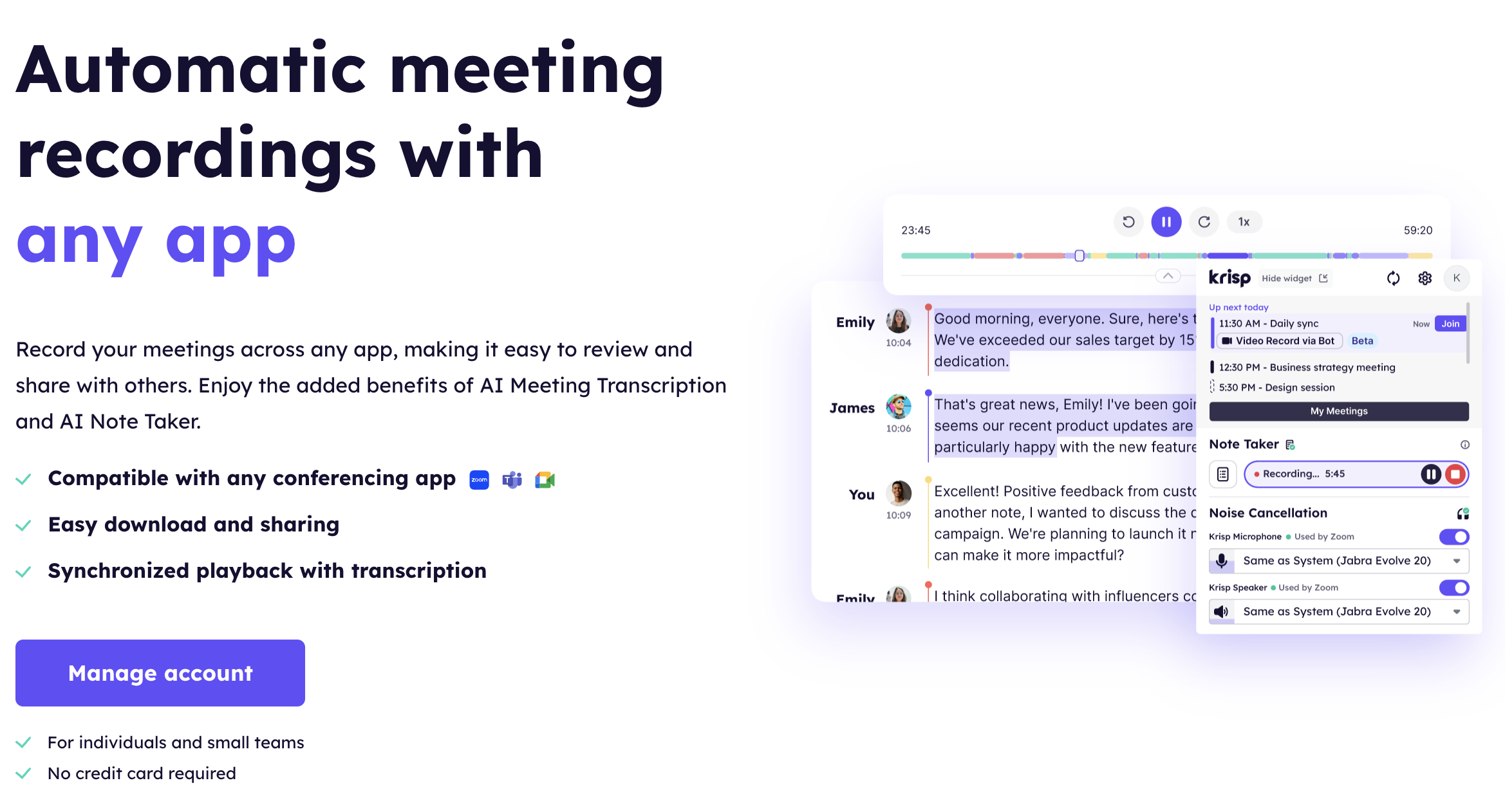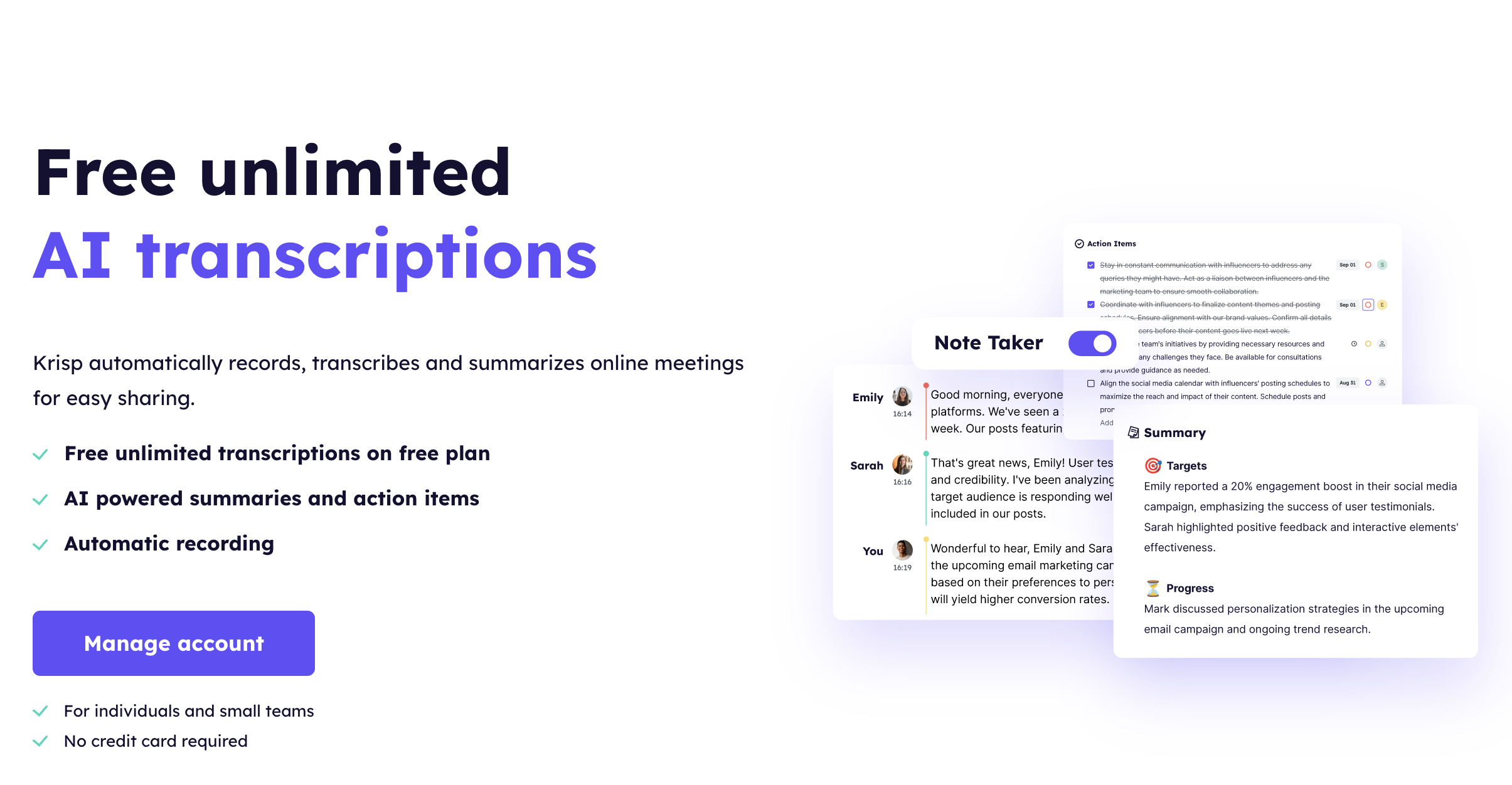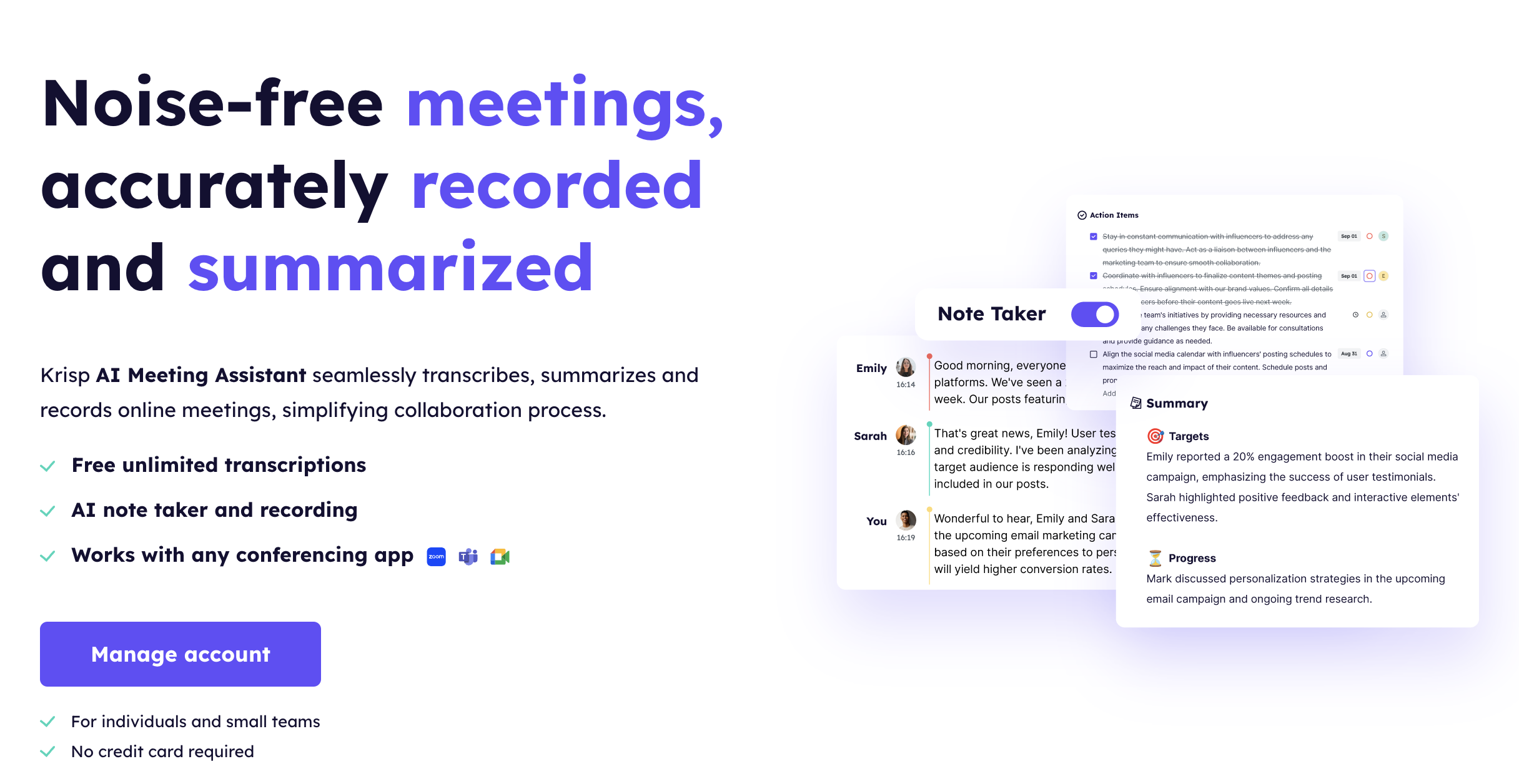Developing strong work habits is essential for navigating today’s fast-paced workplace. In 2024, as remote work and digital tools continue to reshape our daily routines, cultivating effective habits can make all the difference in achieving workplace success. Whether it’s improving your productivity, staying organized, or fostering a positive work environment, good habits set the foundation for long-term growth and fulfillment.
This article explores the top 15 work habits you need to develop, from staying healthy and safe to fostering relationships and adapting to new trends. Plus, you’ll find tips on avoiding common bad habits and how Krisp’s AI Meeting Assistant can support your goals.
Key Takeaways
- Work habits are the patterns and routines you develop that influence your productivity, relationships, and overall success at work.
- Developing positive work habits like goal-setting, time management, and proactive communication can boost productivity and improve workplace relationships.
- Practicing healthy work habits such as taking breaks, staying hydrated, and maintaining good posture helps you stay energized and focused.
- Safe work habits like organizing your workspace and following equipment guidelines protect you and your colleagues from potential risks.
- Fostering habits for happiness at work, such as expressing gratitude and building positive relationships, can enhance job satisfaction and overall well-being.
- Gen Z work habits emphasize work-life balance, the use of technology, and a desire for meaningful work, which are reshaping workplace culture.
- Avoiding bad work habits like procrastination, poor communication, and excessive phone use can help you stay on track and avoid unnecessary stress.
- Krisp’s AI Meeting Assistant supports productive work habits with features like noise cancellation, meeting recording, real-time transcription, summaries, and action items, helping you stay organized and focused.
- Use the Work Habit Improvement Game to track your progress with positive habits and identify areas for growth over time.
- Reflecting on your progress with a Work Habits Checklist allows you to celebrate wins and continue building effective habits for workplace success.
What Are Work Habits?
Work habits are the little routines and patterns you bring to your job every day. They’re basically your go-to actions and attitudes at work—like how you tackle tasks, interact with colleagues, and manage your responsibilities. These habits can really shape how you get things done and how people see you in a professional setting.
Positive work habits—like staying organized, being on time, or going the extra mile—can really boost your productivity and even help you stand out in the workplace. On the flip side, some habits can hold you back. Think procrastination or not paying enough attention to detail. Those can affect your performance and how others view your contributions.
Top 15 Work Habits to Develop in 2024
Building strong work habits is a great way to set yourself up for success. We will dive into different types of work habits—from the ones that boost your productivity to those that keep you safe and happy on the job. By developing these habits, you’ll be better equipped to handle whatever comes your way at work and make each day a little more rewarding.
Positive Work Habits
- Goal Setting
Setting SMART goals helps you stay focused and gives you a sense of direction in your daily tasks.
- Time Management
Prioritizing tasks and managing your time well ensures that you meet deadlines and stay on top of your workload.
- Continuous Learning
Making time to learn new skills and stay updated with industry trends keeps you adaptable and valuable to your team. Adopting techniques like focused note-taking can significantly improve how well you retain information, which is especially helpful in fast-paced work environments.
- Proactive Communication
Communicating openly with colleagues and supervisors helps prevent misunderstandings and builds trust.
- Accountability
Taking responsibility for your actions and tasks shows reliability and builds credibility with your team.
Healthy Work Habits
- Taking Breaks
Regular breaks help you recharge, stay focused, and avoid burnout throughout the day.
- Staying Hydrated
Drinking enough water is essential for maintaining energy and concentration levels.
- Practicing Good Posture
Proper posture can prevent physical discomfort and long-term health issues from sitting at a desk all day.
- Mindfulness
Taking a few minutes to practice mindfulness can help reduce stress and improve focus.
- Healthy Snacking
Choosing nutritious snacks over sugary treats helps keep your energy steady and your mind clear.
Safe Work Habits
- Organizing Your Workspace
Keeping your workspace tidy reduces the risk of accidents and helps you work more efficiently.
- Using Equipment Properly
Following instructions and safety guidelines when using equipment minimizes the chance of injury.
- Being Mindful of Your Surroundings
Staying aware of what’s going on around you can help prevent accidents and ensure your safety.
- Reporting Hazards
Letting your supervisor know about any potential safety issues helps keep everyone in the workplace safe.
- Practicing Ergonomics
Setting up your workstation ergonomically can prevent physical strain and promote long-term health.
Habits for Happiness at Work
- Expressing Gratitude
Taking time to thank your coworkers and recognize their efforts creates a positive work environment.
- Building Positive Relationships
Engaging with colleagues and building connections can make work more enjoyable and supportive.
- Celebrating Small Wins
Acknowledging and celebrating your achievements, no matter how small, keeps you motivated and focused.
- Taking Time for Reflection
Reflecting on your day helps you appreciate your accomplishments and think about areas for improvement.
- Setting Personal Boundaries
Maintaining a healthy work-life balance prevents burnout and helps you stay happy and engaged at work.
Gen Z Work Habits
- Prioritizing Work-Life Balance
Gen Z values flexibility and balance, ensuring they have time for both work and personal life. Many in this generation prefer models like hybrid remote work, which offers a balance of in-office collaboration and remote flexibility.
- Embracing New Technology
Staying updated with the latest tech trends and tools helps streamline work processes and increase efficiency.
- Seeking Purposeful Work
Focusing on roles and tasks that align with personal values and goals can make work feel more fulfilling.
- Open Feedback Loops
Regular, transparent feedback is essential for Gen Z, as it helps them grow and adapt in their roles.
- Advocating for Inclusivity
Embracing diversity and inclusion helps create a welcoming workplace for everyone.
7 Bad Work Habits to Avoid
Procrastination
Putting things off until the last minute can create unnecessary stress and often leads to rushed, lower-quality work. Breaking tasks into smaller steps and setting mini-deadlines can help you avoid the trap of procrastination.
Multitasking
Trying to handle multiple things at once might feel productive, but it often leads to mistakes and slows you down. Focusing on one task at a time helps you work more efficiently and produce better results.
Neglecting Deadlines
Missing deadlines can throw off your team and impact your reputation. By setting reminders and prioritizing your tasks, you can stay on top of deadlines and keep things running smoothly.
Skipping Breaks
Working straight through the day without breaks can wear you down and kill your productivity. Taking short breaks actually helps you recharge and stay focused, so you can finish the day strong.
Being Disorganized
A messy workspace or a chaotic schedule can add stress and make it harder to stay on track. Keeping things tidy and using tools like calendars or to-do lists can help you stay organized and save time.
Negative Attitude
Constantly focusing on the negative can make work feel like a drag and bring down your team’s morale. Shifting your perspective to look for solutions and staying positive can make a big difference in how you and those around you experience work.
Avoiding Feedback
Shying away from feedback can hold you back from learning and improving. Embracing constructive criticism can be tough, but it’s one of the best ways to grow and advance in your career.
How to Develop and Maintain Good Work Habits
Creating and sticking to good work habits can really transform your productivity and help make your workday flow more smoothly. With some simple steps—and a little help from Krisp’s AI Meeting Assistant—you can build habits that last. Here’s how you can get started:
Start Small and Be Consistent
When it comes to building new habits, starting small can make all the difference. If you want to boost your meeting productivity, you could begin by using Krisp’s meeting recording feature. This way, you capture everything important without feeling like you have to change everything at once. Consistency is key, so reviewing these recordings regularly can help you stay organized and on track.
Set Clear Goals
Having specific goals helps keep you motivated. Think about the work habits you want to develop and set clear targets. If better note-taking is one of your goals, try using Krisp’s real-time transcription feature. With automatic transcriptions, you’ll have accurate notes without the stress of writing everything down. Make it a goal to review these transcriptions every week to see how you’re improving.
Track Your Progress
Seeing your progress can be a big motivator. Krisp’s meeting summaries feature is perfect for this—it captures the main points and action items from each meeting. Regularly reviewing these summaries helps you stay on top of your tasks and lets you see just how far you’ve come with your new habits.
Seek Feedback and Stay Open to Adjustments
Feedback is a big part of refining your habits. In work environments that support asynchronous communication, you can use Krisp’s action items feature to share and receive feedback at times that work best for you. This way, you can make any necessary adjustments and stay flexible as you improve.
Find Support in Your Work Environment
Your surroundings play a big role in building good habits. Getting support from your team can make it easier to stay consistent. In workplaces that value team morale, Krisp’s meeting recording feature can be a huge help. It ensures everyone has access to meeting notes, so your whole team can stay aligned and make progress together.
Use Reminders and Cues
Little reminders can make a big difference in keeping up with new habits. For example, set a reminder to review your Krisp meeting summaries after each meeting. It’ll help you keep all the important points fresh in your mind and make it easier to stay on top of tasks.
Celebrate Your Wins
Don’t forget to acknowledge your progress! Every time you use Krisp’s features—whether it’s transcription for better notes or action items to keep tasks organized—take a moment to appreciate what you’ve achieved. Celebrating these small wins helps reinforce your good habits and keeps you motivated to continue.
How Krisp’s AI Meeting Assistant Can Support Productive Work Habits
Krisp’s AI Meeting Assistant is packed with features that make it easier to stay organized and productive. Here’s how each one can help you build better work habits:
Noise Cancellation: Krisp’s noise cancellation feature blocks out background noise, so you can focus on the conversation without distractions. Whether you’re dealing with a noisy environment or working from home, this feature helps you stay engaged and present during meetings, allowing you to participate fully and absorb information more effectively.
Meeting Recording: With automatic recording, you can really focus on what’s being discussed without scrambling to take notes. You’ll know that all the details are captured, so you can go back and review anything you missed. This way, you’re fully present in the meeting and don’t have to worry about keeping up.

Real-Time Transcription: The live transcription feature provides an instant, accurate record of everything said. No more frantic note-taking or worrying about missing key points. You get a complete transcript right away, which you can refer to later for important details or decisions—perfect for keeping track of everything without any extra effort.

Summaries: After each meeting, Krisp gives you a clear, concise summary of the main points, decisions, and topics discussed. It’s a quick way to refresh your memory and stay on top of what’s going on, especially when you’re dealing with back-to-back meetings. Instead of sifting through pages of notes, you get the highlights in one place.
Action Items: Krisp’s AI note taker for meetings automatically captures and organizes accurate action items for you. This makes it easy to prioritize your tasks and ensures nothing slips through the cracks. Having a list of follow-ups ready to go helps you stay accountable and keeps your workload manageable.

Bonus: “How Have I Improved My Work Habits?”
Improving your work habits can be a rewarding journey, and it’s helpful to reflect on the progress you’ve made along the way. Here’s a fun checklist you can use to see how far you’ve come or even challenge yourself to keep building those habits!
| Work Habits Checklist |
|---|
|
Track Your Progress
You can treat this checklist as a weekly or monthly challenge to keep yourself accountable.
For each habit you’ve consistently practiced, give yourself a point. The more points you rack up, the more you’ll see how these small changes are adding up. Revisit this list regularly to track your growth and set new goals as you continue improving your work habits.
This reflection helps you stay motivated, and it’s a reminder of the positive habits you’ve developed—whether it’s being more present in meetings, using tools like Krisp’s AI Meeting Assistant to streamline your workflow, or simply staying organized. Celebrating these wins helps reinforce your progress and keeps you on the path to even better work habits.
Work Habit Improvement Game
Here’s a simple and fun game to help you track your work habits and see just how much progress you’re making. It’s easy to play and gives you a clear picture of where you’re excelling and where you could improve.
How to Play:
- Create a Habit Tracker
Start by listing the positive work habits you want to focus on for the week. These could include things like using noise cancellation during meetings, actively listening, setting daily goals, or organizing your workspace.
- Assign Points
Each habit is worth one point per day. Every time you successfully practice one of these habits, you earn a point. For example:
|
- Track Daily Progress
At the end of each day, mark off the habits you completed and tally up your points. You can use a simple notebook, a spreadsheet, or even a habit-tracking app—whatever works best for you!
- Review Your Score at the End of the Week
At the end of the week, add up your points to see your total score. Take a look at which habits you consistently practiced and where you may have missed a few points. This will give you a clear picture of your strengths and areas to improve.
- Set New Goals for Next Week:
Based on your score, set a new challenge for the coming week. Focus on building up the habits where you scored lower, and see if you can beat your previous score.
Why Play?
This game is a fun way to stay motivated and build productive work habits. By tracking your progress daily, you’ll be able to see exactly where you’re excelling and where you can push yourself a little further. Plus, it adds a little competition into your routine—even if it’s just with yourself! Over time, these small changes can make a big impact on your productivity and overall work experience.
FAQs


